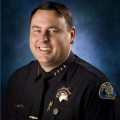According to the San Jose Police Duty Manual, an officer may not, “initiate contact” with a suspect solely on the basis of race, What this meant is that officers could not stop a car because it was driven by African Americans or stop someone on the street on suspicion of being drink simply because that person was Latino. Violations of this were deemed racial profiling. Under the city’s new police chief, Chris Moore, the definition of racial profiling has been expanded to encompass any act of biased behavior during an encounter with the public, even if the original reason for stopping them was valid.
Community groups and city officials praised the policy shift, saying that it will help to resolve the tense relationship that now exists between the SJPD and minority communities. While overt racism by the police is clearly banned, the new regulation addresses more subtle forms of racism that lead to charges of racial profiling. An example of this, according to Independent Police Auditor LaDoris Cordell, is asking a Latino suspect to sit on the curb. ““If an officer has a Latino man sit on the curb,” she explained, “then would the officer have a white man in a suit sit on a curb, if the circumstances were the same?”
Instances such as this form the basis of the most frequent charges of subtle racism that Cordell addresses. In one instance, for example, Angel Luna was pulled over by the police, ostensibly for driving with a cracked windshield. While that may have been a sufficient excuse in itself, one of the first questions Luna was asked was who his parole officer is. Luna later complained about the incident, but his case was rejected. Under the new regulations for police behavior, his case may have been heard.
Moore also called for more investigations into incidents of bias exhibited by the police toward minorities. “It’s about time,” say community leaders, pleased with the new direction that the SJPD is taking.
 Street View Coming to Israel
Street View Coming to Israel 
